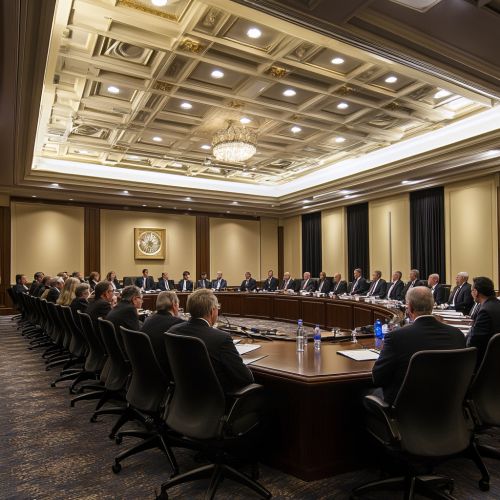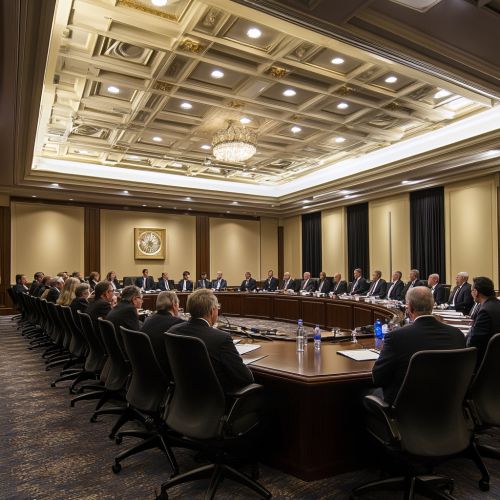National Governors Association: Difference between revisions
(Created page with "== History and Formation == The NGA was founded in 1908 as the National Governors' Conference by President Theodore Roosevelt. The primary objective was to provide a platform for governors to discuss and address issues of national importance, particularly those that required a coordinated effort across state lines. Over time, the organization evolved to become the National Governors Association, reflecting its broader scope and inf...") |
No edit summary |
||
| Line 59: | Line 59: | ||
* [[United States Conference of Mayors]] | * [[United States Conference of Mayors]] | ||
[[Image:Detail-97695.jpg|thumb|center|Governors meeting in a large conference room.|class=only_on_mobile]] | |||
[[Image:Detail-97696.jpg|thumb|center|Governors meeting in a large conference room.|class=only_on_desktop]] | |||
[[Category:Governors of the United States]] | [[Category:Governors of the United States]] | ||
[[Category:Political organizations in the United States]] | [[Category:Political organizations in the United States]] | ||
[[Category:Public policy organizations]] | [[Category:Public policy organizations]] | ||
Latest revision as of 08:46, 19 August 2024
History and Formation
The NGA was founded in 1908 as the National Governors' Conference by President Theodore Roosevelt. The primary objective was to provide a platform for governors to discuss and address issues of national importance, particularly those that required a coordinated effort across state lines. Over time, the organization evolved to become the National Governors Association, reflecting its broader scope and influence.
Structure and Membership
The NGA is a bipartisan organization composed of the governors of the 55 states, territories, and commonwealths of the United States. Membership is automatic for all sitting governors, and the organization operates through a series of committees and task forces that focus on specific policy areas. These committees include:
- Economic Development and Commerce
- Education and Workforce
- Health and Human Services
- Homeland Security and Public Safety
- Natural Resources
- Community Renewal and Regional Development
The NGA is governed by a chair and vice-chair, who are elected annually by their peers. The chair alternates between the two major political parties to ensure bipartisan leadership.
Policy and Advocacy
The NGA plays a crucial role in shaping national policy by advocating for state interests at the federal level. The organization works closely with Congress and the Executive Branch to influence legislation and regulatory actions. Key areas of focus include:
- **Healthcare**: The NGA advocates for policies that ensure states have the flexibility to manage their healthcare systems effectively. This includes issues related to Medicaid, mental health services, and public health emergencies.
- **Education**: The NGA supports initiatives that promote educational equity and excellence. This includes advocating for federal funding for K-12 education, higher education, and workforce training programs.
- **Infrastructure**: The NGA works to secure federal investments in transportation, energy, and broadband infrastructure to support economic growth and improve quality of life in states.
- **Environment**: The NGA engages in policy discussions related to environmental protection, climate change, and natural resource management.
Annual Meetings and Events
The NGA hosts two major meetings each year: the Winter Meeting in Washington, D.C., and the Summer Meeting, which is held in a different state each year. These meetings provide a forum for governors to collaborate, share best practices, and develop collective strategies to address pressing issues. In addition to these major events, the NGA also organizes numerous workshops, webinars, and conferences throughout the year.
Research and Innovation
The NGA Center for Best Practices is the research and development arm of the organization. It provides governors and their staff with data-driven analysis, policy recommendations, and technical assistance on a wide range of issues. The Center focuses on innovative solutions to complex challenges, such as:
- **Opioid Crisis**: Developing strategies to combat opioid addiction and improve access to treatment and recovery services.
- **Cybersecurity**: Enhancing state-level cybersecurity measures to protect critical infrastructure and sensitive data.
- **Workforce Development**: Identifying effective approaches to workforce training and education to meet the demands of a rapidly changing economy.
Funding and Financial Structure
The NGA is funded through a combination of state dues, federal grants, and private sector contributions. State dues are assessed based on a formula that considers population and other factors. Federal grants support specific projects and initiatives, while private sector contributions come from corporations, foundations, and other organizations that share the NGA's goals.
Challenges and Criticisms
Despite its many accomplishments, the NGA has faced challenges and criticisms over the years. Some critics argue that the organization is too focused on consensus-building and avoids taking strong stances on controversial issues. Others contend that the NGA's reliance on private sector funding can lead to conflicts of interest. Nonetheless, the NGA remains a vital institution for fostering collaboration and innovation among the nation's governors.
Future Directions
Looking ahead, the NGA is poised to play an increasingly important role in addressing emerging issues such as:
- **Climate Resilience**: Developing state-level strategies to mitigate and adapt to the impacts of climate change.
- **Healthcare Innovation**: Promoting the adoption of telehealth and other technological advancements to improve healthcare delivery.
- **Economic Recovery**: Supporting states in their efforts to recover from the economic impacts of the COVID-19 pandemic and build more resilient economies.
See Also
- Council of State Governments
- National Conference of State Legislatures
- United States Conference of Mayors


